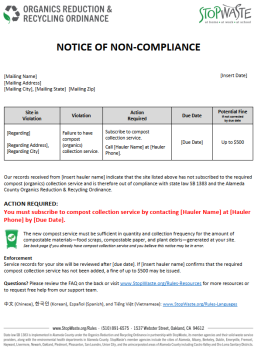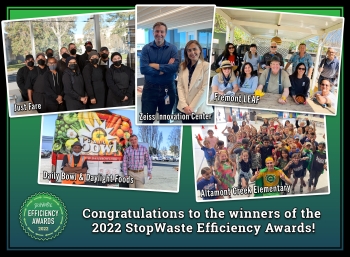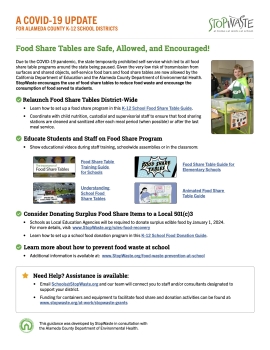Resource Library
 Policies
Policies | 06/09/2022
| 06/09/2022At a recognition event on June 9, StopWaste celebrated the recipients of the 2022 StopWaste Efficiency Awards, given for outstanding achievements in waste reduction, community engagement, and environmental stewardship.
Read More
While food service ware may not be the first thing you think of when planning an event, being thoughtful about how food and beverages are served can support reducing waste and exposure to toxic chemicals, among other sustainability goals. As part of your planning, first assess whether reusables are available and practical for the application. If disposables are necessary, be sure to also check with your hauler/composter/facility ahead of time regarding what types of items they accept.
Read More Topic Briefs
Topic BriefsStopWaste’s RE:Source Guide is Alameda County’s one-stop shop for answers on what to do with an unwanted item. The Guide provides easy access to information on proper disposal with the goal of maximizing the benefits of compost, reuse, repair and recycling, while minimizing contamination from items going in the wrong bin.
Read More
Due to the COVID-19 pandemic, the state temporarily prohibited self-service which led to all food share table programs around the state being paused. Given the very low risk of transmission from surfaces and shared objects, self-service food bars and food share tables are now allowed by the California Department of Education and the Alameda County Department of Environmental Health.
Read MoreThe San Francisco Bay Clean Boating Map features locations of marina-based pollution prevention services (used oil collection, sewage and bilge pump-out, oil absorbent distribution and collection, marine battery collection), mobile boat-to-boat services and helpful information about clean and safe boating practices.
Read More- RFP-RFQ
Release Date: May 24, 2022
Qualifications Due: June 21, 2022The June 21, 2022 deadline has passed and we are no longer accepting submittals.
Read More  Topic Briefs
Topic BriefsA new California State law, SB 1383, aims to keep food and other compostable materials out of landfills to reduce methane emissions that contribute to climate change. An important requirement of the law is that food generating businesses must recover surplus edible food that would otherwise be disposed of and donate it to feed people.
Read MoreThis recordkeeping document was adapted from CalRecycle’s Model Recordkeeping Tool for food recovery organizations and services, to ensure compliance with the monthly recordkeeping requirements. The use of this specific tool is optional. The tool can be customized by food recovery organizations and services to assist with SB 1383, ORRO or other local ordinance compliance.
Read More